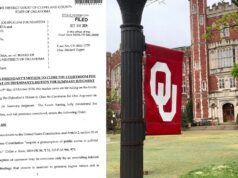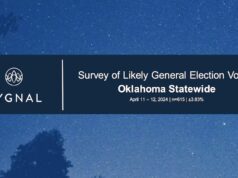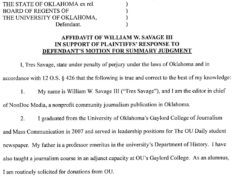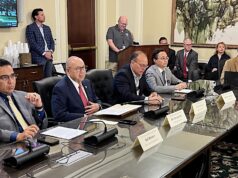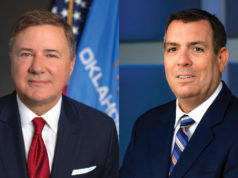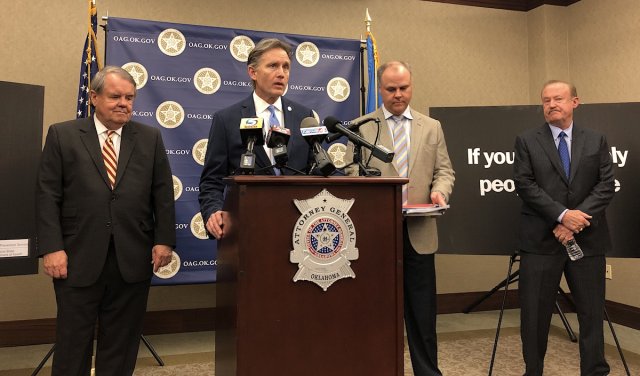

Two and a half years after filing his landmark lawsuits against multiple opioid manufacturers, Oklahoma Attorney General Mike Hunter sued “the nation’s three leading” opioid distributors in Cleveland County District Court today.
“These companies (…) failed at their critical functions and duties to prevent the flood of opioids that has saturated our state over the last two decades fueling the current crisis,” Hunter said during an afternoon press conference. “In fact, these companies have a responsibility to stop shipments of suspicious orders when red flags are raised.”
Hunter’s suit claims McKesson Corporation, Cardinal Health and AmerisourceBergen ignored red flags and should have known disproportionate numbers of pills were being shipped to Oklahoma. In December, Michigan sued the same three opioid distributors — as well as Walgreens — under a drug dealer liability law. In October, the three companies settled a lawsuit with two counties in Ohio.
“To say these companies have blood on their hands is an understatement,” Hunter said. “Just as we hold individuals accountable for their bad actions, we’ve got to hold these companies accountable for what they did, what they do and what they need to do to fix this crisis.
“Clearly, these companies have turned a blind eye to the death and devastation they were causing in Oklahoma and around the nation.”
‘Massive and unjustifiable amounts of opioids’
Hunter’s new lawsuit against opioid distributors seeks a yet-to-be-determined amount of damages for negligence and misconduct, a separate legal argument from his “public nuisance” claim proven against opioid manufacturer Johnson & Johnson last year.
“These companies made billions of dollars while supplying massive and unjustifiable amounts of opioids,” Hunter said.
Brad Beckworth, a partner with the Texas law firm Nix Patterson, said evidence against the three companies is substantial. He said the companies could send “big city lawyers” to Oklahoma to defend the claims or choose a separate option.
“Another way is to fully cooperate with this gentleman, Attorney General Hunter (…) to step up and take responsibility for the problem,” Beckworth said. “There’s two paths, and we’re ready for either one of them.”
Michael Burrage, another contracted attorney and partner with the Whitten Burrage law firm, concurred with Beckworth about the value for all parties to reach a settlement.
“Mark Twain once said, ‘Maybe they’ll surprise us and do the right thing.’ I hope that’s the case,” Burrage said.
Burrage’s law partner mentioned his personal connection to the topic.
“I started about 17 years ago (…) working to solve the addiction problem. I lost a son to addiction 17 years ago,” said Reggie Whitten. “I got to watch this opioid epidemic. I got to watch the deaths mount up. But for every death, we know there are far more people whose lives are ruined.”
McKesson: ‘We have taken action’
On McKesson’s website, the medical industry giant features a page titled, “What is McKesson doing to fight the crisis?” The “media response” page states:
We have taken action through our corporate activities, which include educating the state-licensed and DEA-registered pharmacies and hospitals to whom we deliver about the importance of compliance with DEA regulations, as well as how to identify potential warning signs of prescription abuse and diversion. Additionally, McKesson contributed $100 million to the Foundation for Opioid Response Efforts (FORE), a non-profit dedicated to combating the opioid crisis in the U.S.
Cardinal Health also has a webpage addressing the nation’s opioid epidemic:
Our Board of Directors and the entire Cardinal Health team care deeply about the devastating impact on our communities of the over-prescribing of opioid pain medications and the abuse of pain medications and illegal “street” narcotics. We are working to solve this complex national public health crisis.
AmerisourceBergen has a similar statement posted online:
We are committed to joining other healthcare stakeholders, government entities, civic organizations, law enforcement agencies and individuals to overcome this terrible tragedy.
Friday, Hunter’s office announced an $8.75 million preemptive settlement with Endo Pharmaceuticals, maker of the controversial oxymorphone product Opana.
“The money from this settlement as well as the money from other settlements will allow us to begin abating Oklahoma’s problem,” Hunter said in a press release.
Oklahoma’s other opioid settlements
The results of Hunter’s “other settlements” with opioid manufacturers have been complex.
Joined by his local contracted counsel on June 30, 2017, Hunter first announced his opioid lawsuit against Johnson & Johnson, Purdue Pharma, Teva Pharmaceuticals and several subsidiaries. Two and a half years later, he and his team have produced the following results, though figures here include money owed to Hunter’s private contracted law firms, Whitten Burrage and Nix Patterson:
- March 2019: A $270 million settlement with Purdue Pharma designated by Hunter for the creation of a new foundation supporting the OSU Center for Wellness and Recovery in Tulsa. The agreement drew bipartisan criticism from legislators, who ultimately passed a bill reiterating Hunter’s obligation to deposit settlement proceeds into the State Treasury;
- June 2019: An $85 million settlement with Teva Pharmaceuticals, which included an agreement that Teva not market opioids in Oklahoma until 2027. That settlement money ultimately ended up in the State Treasury;
- August 2019: The Sackler family — owners of Purdue Pharma — made and were praised by state officials for a donation of proprietary “research molecules” and “certain associated data” to the OSU Center for Wellness and Recovery for addiction science and treatment research;
- August 2019: Cleveland County District Court Judge Thad Balkman found that Johnson & Johnson had created a public nuisance through its marketing of opioids in Oklahoma. Balkman ultimately issued an order for Johnson & Johnson to pay $465 million for one year’s worth of nuisance abatement. Hunter’s team argued for funding of additional abatement years, but Balkman stuck to his order. Johnson & Johnson announced an appeal.
Hunter said Monday the foundation established in the Purdue settlement “is operational” and awaiting appointments from House and Senate leadership as well as Gov. Kevin Stitt.
“They haven’t expended any funds because we are still working with CMS with respect to whatever federal share is going to occur with regard to that settlement,” Hunter said, referencing the federal Medicaid and Medicare agency’s belief that it deserves a share of the money.
Hunter said Oklahoma ultimately prevailed compared to other states regarding Purdue by agreeing with the Sackler family to establish the national addiction center at OSU.
“Purdue is in bankruptcy. So as we were in negotiations with them, we had to be creative because the options were zero or something that would benefit the state,” Hunter said. “I think what’s resulted in months subsequent to that with — Purdue declaring bankruptcy — the state is the one political subdivision in the country that has gotten something as opposed to what happens to the rest of the states and the rest of the cities and counties. The result may be zero.”









